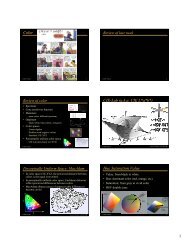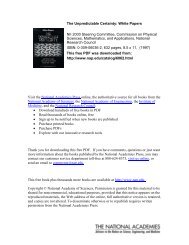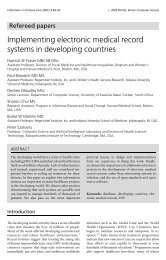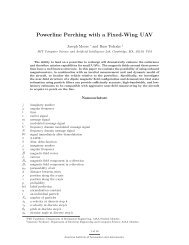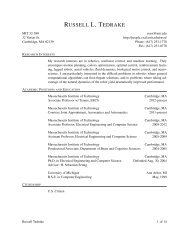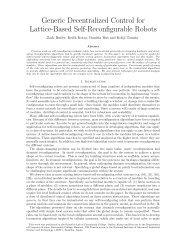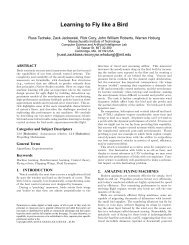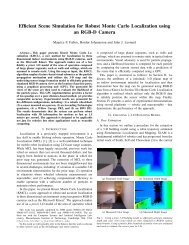[ti]The “Vulgar Spirit of Blogging”: On Language, Culture ... - CSAIL
[ti]The “Vulgar Spirit of Blogging”: On Language, Culture ... - CSAIL
[ti]The “Vulgar Spirit of Blogging”: On Language, Culture ... - CSAIL
Create successful ePaper yourself
Turn your PDF publications into a flip-book with our unique Google optimized e-Paper software.
“<strong>The</strong> Vulgar <strong>Spirit</strong> <strong>of</strong> <strong>Blogging”</strong>:<br />
<strong>On</strong> <strong>Language</strong>, <strong>Culture</strong>, and Power in Persian Weblogestan<br />
Research Ar<strong>ti</strong>cles<br />
ALIREZA DOOSTDAR<br />
American Anthropologist Vol. 106, No. 4 December 2004<br />
This ar<strong>ti</strong>cle is an ethnographic study <strong>of</strong> Persian-language weblogs (blogs), focusing on a<br />
divisive argument among Iranian bloggers that came to be known as the “vulgarity<br />
debate.” Sparked <strong>of</strong>f by a controversial blogger who ridiculed asser<strong>ti</strong>ons that Islam was<br />
compa<strong>ti</strong>ble with human rights, the debate revolved around the claim that blogging had a<br />
“vulgar spirit” that made it easy for everything from standards <strong>of</strong> wri<strong>ti</strong>ng to principles <strong>of</strong><br />
logical reasoning to be undermined. My study focuses primarily on the linguis<strong>ti</strong>c side <strong>of</strong><br />
the controversy: I analyze blogging as an emergent speech genre and iden<strong>ti</strong>fy the<br />
structural features and social interac<strong>ti</strong>ons that make this genre seem “vulgar.” I also<br />
examine the controversy as a confronta<strong>ti</strong>on between bloggers with unequal access to<br />
cultural capital and a struggle over “intellectualist” hegemony. In the conclusion, I use<br />
the construct <strong>of</strong> “deep play” to weave together mul<strong>ti</strong>ple layers <strong>of</strong> structure, explana<strong>ti</strong>on,<br />
and meaning in the debate. [Keywords: Iran, weblogs, computer-mediated<br />
communica<strong>ti</strong>on, speech genres, social status]<br />
Blogging, due to its mundane nature, has the capacity to nurture the spirit <strong>of</strong> vulgarity.<br />
And what great pains intellectuals have to endure when they consider blogging to be a<br />
serious matter but at the same <strong>ti</strong>me fear this destruc<strong>ti</strong>ve plague … Refusing to comply<br />
with the principles <strong>of</strong> proper wri<strong>ti</strong>ng in the Persian language, including correct spelling<br />
and orthography, is the simplest effect that the blogging phenomenon, as a vulgar matter,<br />
can create in the cultural personality <strong>of</strong> a blogger. <strong>The</strong> severest effect <strong>of</strong> vulgarity is to<br />
recklessly make any kind <strong>of</strong> cultural, philosophical, religious or ar<strong>ti</strong>s<strong>ti</strong>c claim. To express<br />
one’s own opinion in such a way that its language and intona<strong>ti</strong>on is both personal and<br />
conveys emo<strong>ti</strong>on, in any field or discipline, is not deplorable, but rather the func<strong>ti</strong>on <strong>of</strong><br />
blogging. But to preten<strong>ti</strong>ously make claims about any topic is to be affected by the vulgar<br />
spirit <strong>of</strong> blogging. It’s not one’s own fault either; the vulgar environment has gradually<br />
left its mark. –Seyyed Reza Shokrollahi, Khaabgard<br />
1
INTRODUCTION: THE VULGAR SPIRIT<br />
<strong>On</strong> October 26, 2003, Hossein Derakhshan, author <strong>of</strong> a vastly popular Persian-language<br />
weblog (a website consis<strong>ti</strong>ng <strong>of</strong> regularly updated wri<strong>ti</strong>ngs arranged in reverse<br />
chronological order, usually by a single author), wrote an entry in which he mocked<br />
asser<strong>ti</strong>ons made a few days earlier by Iranian Nobel Peace Prize laureate Shirin Ebadi<br />
that Islam and human rights were not contradictory (Derakhshan 2003c). Derakhshan, or<br />
“Hoder” as he likes to be called, charged that the “secular” Ebadi had turned into an<br />
ayatollah after she won the celebrated peace prize, and that this was a major sign that the<br />
lawyer intended to enter Iranian poli<strong>ti</strong>cs and possibly run for the presidency in 2005.<br />
Hoder also deplored the “poli<strong>ti</strong>cal” claim that Islam and human rights were compa<strong>ti</strong>ble,<br />
and, ci<strong>ti</strong>ng a single verse from the Qur’an instruc<strong>ti</strong>ng men how to deal with their wives,<br />
he asserted that Islam was inherently at odds with the most fundamental rights <strong>of</strong> human<br />
beings. He also created an opinion poll on his entry to ask his readers what they thought<br />
about Ebadi’s remarks.<br />
Hoder’s entry on his blog, Sardabir: Khodam (Editor: Myself), provoked a huge<br />
reac<strong>ti</strong>on in the Iranian blogging community, which the bloggers themselves usually call<br />
weblogestan. 1 Eighty-one comments, both suppor<strong>ti</strong>ve and damning, appeared on his blog<br />
alone. Numerous others wrote their opinions on their own blogs, and some sent<br />
“trackback pings” to Hoder’s entry, informing him (and his readers) <strong>of</strong> their ar<strong>ti</strong>cles.<br />
A notable response to Hoder was an entry on October 30 by Seyyed Reza<br />
Shokrollahi, a journalist and literary cri<strong>ti</strong>c, on his blog Khaabgard (Sleepwalker; see<br />
Figure 1). Under the <strong>ti</strong>tle Zende baad gand-e ebtezaal dar veblaagestaan! (Long live the<br />
s<strong>ti</strong>nk <strong>of</strong> vulgarity in weblogestan!), Shokrollahi lamented that<br />
2
Veblaag-nevisi ba’d az m<strong>of</strong>tazah kardan-e khat va zabaan-e faarsi, tavaaneste har<br />
mozoo’e jeddi va andishe-varzaane raa niz be lajan-e bimaari-e ebtezaal bekeshad va<br />
mesl-e sarataan ham pishraft konad va nevisande va khaanande va hame raa be gand<br />
bekeshad.<br />
[Blogging, after laying waste to the Persian script and language, has been able to drag<br />
every serious and intellectual topic into the scum <strong>of</strong> the disease <strong>of</strong> vulgarity, grow like a<br />
cancerous tumor, and trash the writer, the reader and everyone else]. [Shokrollahi 2003b]<br />
Figure 1 - Screenshot <strong>of</strong> Khaabgard, Reza Shokrollahi’s weblog.<br />
He also remarked that the simplest form <strong>of</strong> ebtezaal (vulgarity) in blogging was disregard<br />
for the spelling and orthographic principles <strong>of</strong> the Persian language, and its most<br />
sophis<strong>ti</strong>cated form was recklessness in making any kind <strong>of</strong> statement in one’s wri<strong>ti</strong>ng. In<br />
a follow-up entry, Shokrollahi wrote that “veblaag-nevisi ye joor neveshtane, va ghalat<br />
3
naneveshtan, savaa-ye mazmoon va mohtava, avvalin qadam baraaye neveshtane<br />
[blogging is a kind <strong>of</strong> wri<strong>ti</strong>ng, and wri<strong>ti</strong>ng correctly, regardless <strong>of</strong> content and subject<br />
matter, is the first step in wri<strong>ti</strong>ng]” (Shokrollahi 2003b). Together, these entries touched<br />
<strong>of</strong>f the bahs-e ebtezaal (vulgarity debate); a cacophony <strong>of</strong> blog entries, online magazine<br />
ar<strong>ti</strong>cles, comments, responses, and counterresponses that con<strong>ti</strong>nued for several weeks.<br />
Wri<strong>ti</strong>ngs differed both in their defini<strong>ti</strong>on <strong>of</strong> vulgarity and in their focus on language or<br />
culture. 2 Although many bloggers sympathized with Shokrollahi’s concerns about vulgar<br />
linguis<strong>ti</strong>c and cultural prac<strong>ti</strong>ces, others charged that he wanted to s<strong>ti</strong>fle free speech and<br />
compared him to government censors. In the domain <strong>of</strong> language, the controversy<br />
surrounded both the need to observe standard orthography and grammar, and the choice<br />
to write in formal or colloquial Persian. Some, including Shokrollahi, maintained that a<br />
set <strong>of</strong> orthographic standards must be observed even when wri<strong>ti</strong>ng in a shekaste (broken)<br />
conversa<strong>ti</strong>onal style, whereas others countered that it was completely logical for one to<br />
write in exactly the same way one thought, even if that meant disregarding linguis<strong>ti</strong>c<br />
standards. A few bloggers on both sides <strong>of</strong> the debate challenged the no<strong>ti</strong>on that a single<br />
standard <strong>of</strong> wri<strong>ti</strong>ng existed, or even that there was a common baseline among the<br />
different standards that one could adhere to.<br />
What follows is an ethnographic study <strong>of</strong> the vulgarity debate, which spanned<br />
approximately two months, from late October to late December 2003. I first took no<strong>ti</strong>ce<br />
<strong>of</strong> Iranian blogs in February 2003, when I stumbled on PersianBlog.com, the first Iranian<br />
weblog hos<strong>ti</strong>ng service <strong>of</strong>fering free web space and blogging tools to thousands <strong>of</strong><br />
Persian speakers. In April, I decided to become a member <strong>of</strong> the community myself by<br />
star<strong>ti</strong>ng two blogs: an English one en<strong>ti</strong>tled Persian Blogger Chronicles, and a Persian one<br />
4
en<strong>ti</strong>tled Parishaan Belaag (disheveled blog) in which I wrote, alongside the conven<strong>ti</strong>onal<br />
personal notes and poli<strong>ti</strong>cal commentaries, my observa<strong>ti</strong>ons and analyses <strong>of</strong><br />
conversa<strong>ti</strong>ons among bloggers and some <strong>of</strong> their emergent sociocultural prac<strong>ti</strong>ces. I<br />
established rela<strong>ti</strong>onships with other bloggers by wri<strong>ti</strong>ng about them on my own blog or<br />
by visi<strong>ti</strong>ng their blogs and commen<strong>ti</strong>ng on their entries. Throughout my research, I had<br />
many interes<strong>ti</strong>ng conversa<strong>ti</strong>ons with Iranian bloggers that were conducted outside the<br />
blogging medium itself, mostly through e-mail and instant messaging but also over the<br />
telephone. Similar to Annette Markham in her research on text-based virtual reality<br />
(1998), I felt it necessary to experience blogging firsthand and over an extended period <strong>of</strong><br />
<strong>ti</strong>me to acquaint myself with the nuances <strong>of</strong> communica<strong>ti</strong>on and social interac<strong>ti</strong>on among<br />
the community <strong>of</strong> bloggers and to better equip myself for interpre<strong>ti</strong>ng and making sense<br />
<strong>of</strong> what bloggers were doing and how they were ar<strong>ti</strong>cula<strong>ti</strong>ng their ac<strong>ti</strong>ons. This<br />
ethnography is, therefore, as much informed (and constrained) by my own experiences as<br />
an amateur blogger trying to make inroads into weblogestan as it is by my observa<strong>ti</strong>on<br />
and interroga<strong>ti</strong>on <strong>of</strong> other bloggers’ communica<strong>ti</strong>ve prac<strong>ti</strong>ces and social interac<strong>ti</strong>ons. 3<br />
<strong>The</strong> vulgarity debate drew my atten<strong>ti</strong>on more than ever before to the complex<br />
linguis<strong>ti</strong>c prac<strong>ti</strong>ces <strong>of</strong> bloggers and their contending understandings <strong>of</strong> what these<br />
prac<strong>ti</strong>ces meant. My interest in this debate had a lot to do with Shokrollahi’s descrip<strong>ti</strong>on<br />
<strong>of</strong> blogging as having a “vulgar spirit.” I view this descrip<strong>ti</strong>on as fit<strong>ti</strong>ng very nicely with<br />
a no<strong>ti</strong>on <strong>of</strong> blogging as a speech genre, in the sense developed by Mikhail Bakh<strong>ti</strong>n<br />
(1986). As an emergent genre, Persian-language blogging may be developing an outer<br />
orienta<strong>ti</strong>on and an inner, thema<strong>ti</strong>c orienta<strong>ti</strong>on that sets it apart from other genres <strong>of</strong><br />
speech, including the <strong>of</strong>fline literary and journalis<strong>ti</strong>c genres that Shokrollahi and some <strong>of</strong><br />
5
his associates had mastered well ahead <strong>of</strong> settling in weblogestan. I argue that the<br />
“intellectualist” frustra<strong>ti</strong>on with this medium reflects an uneasiness with the linguis<strong>ti</strong>c<br />
and cultural prac<strong>ti</strong>ces that are becoming prevalent in tandem with the emergence <strong>of</strong> these<br />
generic orienta<strong>ti</strong>ons. I also argue that the vulgarity debate reflects a cultural and poli<strong>ti</strong>cal<br />
clash between a roshanfekr (intellectual) class who consider themselves to hold a certain<br />
amount <strong>of</strong> authority in matters <strong>of</strong> language and culture and a larger group <strong>of</strong> people who<br />
see blogging as just the place to be free from any kind <strong>of</strong> linguis<strong>ti</strong>c or cultural authority<br />
and are fed up with what one blogger called “intellectualist pretense” (Dolatshahi 2003b).<br />
As I examine some <strong>of</strong> the arguments in the vulgarity debate, I also refer to specific<br />
examples in which bloggers metapragma<strong>ti</strong>cally index themselves as linguis<strong>ti</strong>c and<br />
cultural rebels by being deliberately careless in their wri<strong>ti</strong>ng or by otherwise using<br />
language in unorthodox ways.<br />
ANTHROPOLOGY, TECHNICISM, AND “DEEP PLAY” IN CYBERSPACE<br />
<strong>The</strong>re are at least two reasons why an ethnographic and anthropological perspec<strong>ti</strong>ve is<br />
well suited for studies <strong>of</strong> cyberspace, including the one outlined in this ar<strong>ti</strong>cle. First, there<br />
are a plethora <strong>of</strong> new and interes<strong>ti</strong>ng social forma<strong>ti</strong>ons whose emergent rela<strong>ti</strong>onships,<br />
linguis<strong>ti</strong>c prac<strong>ti</strong>ces, power dynamics, and construc<strong>ti</strong>ons <strong>of</strong> individual and collec<strong>ti</strong>ve<br />
iden<strong>ti</strong><strong>ti</strong>es need to be understood and could benefit immensely from mul<strong>ti</strong>layered,<br />
mul<strong>ti</strong>sited, cross-culturally compara<strong>ti</strong>ve ethnographic analyses grounded in social theory.<br />
Indeed, calls are increasingly being made for an ethnographic and anthropological<br />
approach to the study <strong>of</strong> computer-mediated communica<strong>ti</strong>on and online communi<strong>ti</strong>es<br />
(DiMaggio et al. 2001; Escobar 1994; Fischer 2003; Hakken 1999; Kottak 1996; Miller<br />
6
and Slater 2000; Wilson and Peterson 2002). 4 Second, closely related to the first, is that<br />
too many scholarly inves<strong>ti</strong>ga<strong>ti</strong>ons <strong>of</strong> online communi<strong>ti</strong>es, thus far, have uncri<strong>ti</strong>cally<br />
adopted the utopian or dystopian assump<strong>ti</strong>ons <strong>of</strong> “cybertalk” in the popular imagina<strong>ti</strong>on,<br />
leading to largely unsupportable claims about the revolu<strong>ti</strong>onary consequences <strong>of</strong> the<br />
Internet for social, cultural, and poli<strong>ti</strong>cal processes (Hakken 1999; Wilson and Peterson<br />
2002). Empirical studies that do not take for granted the technicist claims <strong>of</strong> an “Internet<br />
Revolu<strong>ti</strong>on,” that focus on the impacts <strong>of</strong> social and cultural processes on cyberspace as<br />
well as the more-<strong>of</strong>ten cited influences <strong>of</strong> cyberspace on society and culture, and that<br />
view the technologies <strong>of</strong> the Internet and all that is contained within it as cultural<br />
products are much needed for gaining a more realis<strong>ti</strong>c and more nuanced understanding<br />
<strong>of</strong> online communi<strong>ti</strong>es.<br />
My study <strong>of</strong> the vulgarity debate in weblogestan is mo<strong>ti</strong>vated by both <strong>of</strong> these<br />
arguments. Discourse on Iranian blogging is inundated with uncri<strong>ti</strong>cal technicist<br />
assump<strong>ti</strong>ons about the revolu<strong>ti</strong>onary impact <strong>of</strong> blogs on Iranian society, leading to<br />
numerous claims about the ways weblogs are rupturing Iran’s social, cultural, and<br />
poli<strong>ti</strong>cal fabric by promo<strong>ti</strong>ng such previously nonexistent things as freedom <strong>of</strong> expression<br />
and unfettered rela<strong>ti</strong>onships between young men and women (Delio 2003; Editorial 2003;<br />
Girvitz 2002; Hermida 2002). <strong>The</strong>se analyses have been, in my opinion, overly and<br />
naively enthusias<strong>ti</strong>c in extolling the social changes that are (or are wished to be) coming<br />
about as a consequence <strong>of</strong> the adop<strong>ti</strong>on <strong>of</strong> a new communica<strong>ti</strong>on medium by a small<br />
percentage <strong>of</strong> Iranians. 5 Furthermore, they miss the complex patterns <strong>of</strong> adapta<strong>ti</strong>on,<br />
appropria<strong>ti</strong>on, and emergence that characterize the online sociocultural prac<strong>ti</strong>ces <strong>of</strong><br />
bloggers.<br />
7
That the vulgarity debate presents, for ethnographic and anthropological study, a<br />
range <strong>of</strong> interes<strong>ti</strong>ng and complex social interac<strong>ti</strong>ons, linguis<strong>ti</strong>c prac<strong>ti</strong>ces, and power<br />
dynamics should become evident in the following sec<strong>ti</strong>ons. A genera<strong>ti</strong>ve construct I like<br />
to employ in analyzing this debate is that <strong>of</strong> “deep play,” elaborated by Clifford Geertz<br />
(1973) in his famous essay on the Balinese cockfight and picked up by Michael M. J.<br />
Fischer (2003) in his ambi<strong>ti</strong>ous and wide-ranging call for renewing the ethnographic and<br />
anthropological voice in the 21st century. According to Fischer, deep play “refers to<br />
cultural sites where mul<strong>ti</strong>ple levels <strong>of</strong> structure, explana<strong>ti</strong>on, and meaning intersect and<br />
condense, including the cultural phantasmagoria that ground and structure the terrain on<br />
which reason, will, and language operate but cannot contain” (2003:31). As I review the<br />
details and implica<strong>ti</strong>ons <strong>of</strong> the vulgarity debate in the conclusion, I will describe<br />
specifically the mul<strong>ti</strong>ple levels <strong>of</strong> “structure, explana<strong>ti</strong>on, and meaning” that cons<strong>ti</strong>tuted<br />
the vulgarity debate as a site <strong>of</strong> deep play.<br />
A final point needs to be made here about the conceptualiza<strong>ti</strong>on <strong>of</strong> my object <strong>of</strong><br />
study. My research has focused exclusively on linguis<strong>ti</strong>c and cultural prac<strong>ti</strong>ces in an<br />
online context as well as cultural, metalinguis<strong>ti</strong>c, and metapragma<strong>ti</strong>c ar<strong>ti</strong>cula<strong>ti</strong>ons and<br />
contesta<strong>ti</strong>ons <strong>of</strong> these prac<strong>ti</strong>ces—themselves produced and disseminated online. This<br />
should not imply that either the prac<strong>ti</strong>ces themselves or the discussions about them are<br />
separated from the <strong>of</strong>fline contexts in which each blogging subject lives and acts.<br />
Unfortunately, an in-depth study <strong>of</strong> all <strong>of</strong> these <strong>of</strong>fline contexts would be far beyond the<br />
scope <strong>of</strong> my work: <strong>The</strong> bloggers I have encountered in my study are as diverse, and their<br />
contexts as different, as high school and university students, journalists, literary cri<strong>ti</strong>cs,<br />
web designers, academics, and women’s rights ac<strong>ti</strong>vists; living in Tehran, Toronto,<br />
8
Berlin, Boston, London, Prague, and Paris, along with numerous other anonymous and<br />
half-anonymous bloggers and blog readers scattered around the world. Despite this<br />
diversity, there are several important objects <strong>of</strong> inquiry that move across the mul<strong>ti</strong>ple<br />
contexts and bridge the online–<strong>of</strong>fline conceptual divide. <strong>The</strong>se range from the Persian-<br />
language speech genres that compose the linguis<strong>ti</strong>c repertoires <strong>of</strong> Iranians to culturally<br />
cons<strong>ti</strong>tuted and poli<strong>ti</strong>cally charged tastes and sensi<strong>ti</strong>vi<strong>ti</strong>es about “vulgarity” and<br />
ideological and poli<strong>ti</strong>cal conflicts inside Iran that become matters <strong>of</strong> debate among<br />
Iranians from all corners <strong>of</strong> the world by virtue <strong>of</strong> the Internet’s capability to bridge<br />
geographical distance. To interrogate and map out these issues in analyzing the vulgarity<br />
debate, I have attempted to apply and weave together two <strong>of</strong> the modes <strong>of</strong> mul<strong>ti</strong>sited<br />
ethnographic construc<strong>ti</strong>on proposed by George Marcus (1995): namely, “following the<br />
metaphor” (especially as related to the use <strong>of</strong> the term vulgarity, its social significances,<br />
and its grounding within broader cultural and poli<strong>ti</strong>cal configura<strong>ti</strong>ons in Iran) and<br />
“following the conflict” (consis<strong>ti</strong>ng for the most part <strong>of</strong> tracking mul<strong>ti</strong>ple strands <strong>of</strong><br />
tension and debate, both within and outside the blogging community, over controversial<br />
linguis<strong>ti</strong>c and cultural prac<strong>ti</strong>ces). Each method calls for a sort <strong>of</strong> “mobility” in<br />
ethnography across different sites and connects the debate to mul<strong>ti</strong>ple webs <strong>of</strong><br />
significa<strong>ti</strong>on, both online and <strong>of</strong>f.<br />
BLOGGING AS A SPEECH GENRE<br />
Bakh<strong>ti</strong>n (1986) asserts that every utterance takes shape in a definite “speech genre”; that<br />
is, every utterance has “definite and rela<strong>ti</strong>vely stable typical forms <strong>of</strong> construc<strong>ti</strong>on <strong>of</strong> the<br />
whole” (1986:78). Speech genres can be defined by their outer orienta<strong>ti</strong>on to the context<br />
9
<strong>of</strong> produc<strong>ti</strong>on and recep<strong>ti</strong>on and by their inner, thema<strong>ti</strong>c orienta<strong>ti</strong>on. 6<br />
I show in this sec<strong>ti</strong>on that certain structural features <strong>of</strong> blogs, in addi<strong>ti</strong>on to certain<br />
sociocultural prac<strong>ti</strong>ces in the Persian-language blogging community, have been<br />
contribu<strong>ti</strong>ng to the forma<strong>ti</strong>on <strong>of</strong> explicit orienta<strong>ti</strong>ons for blogging that may warrant its<br />
classifica<strong>ti</strong>on as a dis<strong>ti</strong>nct genre <strong>of</strong> speech. <strong>The</strong>se are emergent orienta<strong>ti</strong>ons that arise<br />
from dialogue and fusion between other online and <strong>of</strong>fline speech genres but that are also<br />
<strong>ti</strong>ed to the architecture <strong>of</strong> blogs as a medium <strong>of</strong> communica<strong>ti</strong>on embedded within a larger<br />
“ecology” <strong>of</strong> media on the Internet (Erickson 2000; Herring et al. 2004). <strong>The</strong>ir emergent<br />
character also means they are not fixed and are indeed con<strong>ti</strong>nually contested by different<br />
groups <strong>of</strong> bloggers with different agendas, experiences, and masteries over preexis<strong>ti</strong>ng<br />
genres <strong>of</strong> speech.<br />
Each individual comes to a blog with a stock <strong>of</strong> speech genres at her disposal.<br />
<strong>The</strong>se include “primary” genres that are mostly oral and simple, and “secondary” genres<br />
that are more complex and are usually written (Bakh<strong>ti</strong>n 1986:62). <strong>The</strong> primary genres<br />
that are present in one form or another on Persian-language blogs include an array <strong>of</strong><br />
gree<strong>ti</strong>ng and courtesy rou<strong>ti</strong>nes, small talk, casual poli<strong>ti</strong>cal conversa<strong>ti</strong>on (as in a taxicab),<br />
jokes, gossip, and bathroom graffi<strong>ti</strong> among other genres. Common secondary genres<br />
include various journalis<strong>ti</strong>c forms, literary genres (including different kinds <strong>of</strong> poetry and<br />
prose), scholarly wri<strong>ti</strong>ng, travelogues, personal diaries, radio broadcas<strong>ti</strong>ng, and religious<br />
lamenta<strong>ti</strong>on and devo<strong>ti</strong>onals. Many bloggers and visitors are also familiar with various<br />
online speech genres—including e-mail, instant messaging, chat-room conversa<strong>ti</strong>on, and<br />
asynchronous newsgroup discussion.<br />
<strong>The</strong>ma<strong>ti</strong>cally—that is, as far as an inner orienta<strong>ti</strong>on is concerned—each <strong>of</strong> these<br />
10
speech genres may poten<strong>ti</strong>ally be reproduced in a blog entry or visitor’s comment.<br />
However, the genres’ outer orienta<strong>ti</strong>ons, which are specific to their contexts <strong>of</strong> produc<strong>ti</strong>on<br />
and recep<strong>ti</strong>on, cannot be as easily reproduced. Gree<strong>ti</strong>ng and courtesy rou<strong>ti</strong>nes, for<br />
example, lose the immediacy and temporal structure <strong>of</strong> oral face-to-face conversa<strong>ti</strong>on and<br />
begin to resemble sta<strong>ti</strong>c letters or e-mails when they are carried over to a blogging<br />
context. I have begun to think that the frequent use <strong>of</strong> ellipses in many Persian-language<br />
blog entries and comments is part <strong>of</strong> an attempt to compensate for this uproo<strong>ti</strong>ng <strong>of</strong> the<br />
genre from its oral context, by simula<strong>ti</strong>ng gaps in oral speech that work as cues for turn-<br />
switching, as when a speaker remains silent when it is his interlocutor’s turn to speak.<br />
<strong>The</strong> following visitor’s comment is a par<strong>ti</strong>cularly good example <strong>of</strong> the use <strong>of</strong> ellipses:<br />
Salaam alpar-e geraami … modda<strong>ti</strong>st ke be dalaayeli veblaag-neveshtan raa motevaqqef<br />
karde’am, va be jaay-e aan be jam’aavari-e linkhaayi bedard-bokhor kardam taa<br />
doostaani ke sar mizanand, hadde aqal shaayad bahre-i borde baashand … khob …<br />
khaahesh mikonam lotf karde va sari be veblaag-e man bezanid … va bebinid … baa arz-<br />
e tashakkor … shaad-o salaamat baashid … montazeram.<br />
[Hello dear Alpar … it’s been a while now that I’ve stopped blogging and have started<br />
collec<strong>ti</strong>ng useful links instead so that when people visit, they will at least take away<br />
something useful … well … please pay a visit to my blog … and see for yourself …<br />
thank you … may you be happy and healthy … I’ll be wai<strong>ti</strong>ng]. [Doorandish 2004]<br />
In a similar manner, devo<strong>ti</strong>onal blog entries that resemble the lamenta<strong>ti</strong>ons chanted in<br />
mourning ceremonies for the Shi’a Imams lose much <strong>of</strong> the emo<strong>ti</strong>onal content carried by<br />
aural and visual cues in the oral performances. Often, bloggers who produce such texts on<br />
their blogs use emo<strong>ti</strong>cons, borrowed from instant messaging services like Yahoo<br />
Messenger to express such emo<strong>ti</strong>ons, as in the excerpt in Figure 2 written by a blogger<br />
11
during the mourning month <strong>of</strong> Muharram.<br />
Figure 2 - This is an excerpt from a blog entry mourning for Imam Husayn ibn-e Ali, the<br />
grandson <strong>of</strong> Prophet Muhammad, who died in a battle in Karbala in the late seventh<br />
century. Shemr is the name <strong>of</strong> his murderer: “How nice if when one is dying, one’s head is<br />
on his son’s lap—But I would die for Husayn (peace be upon him)—When he opened his<br />
eyes in the pit, he found that his head was on Shemr’s lap [weeping emo<strong>ti</strong>cons from Yahoo<br />
Messenger]—My friends, in Karbala, in the master’s [Imam Husayn’s] shrine, I saw—With<br />
what respect and humility the pilgrims would enter—<strong>The</strong>y would respectfully turn their<br />
shoes in to the shoe-keeper and enter the shrine barefooted—But the depraved Shemr sat on<br />
Husayn’s chest with his boots on. [weeping emo<strong>ti</strong>cons from Yahoo Messenger]”<br />
Even when complex secondary speech genres like journalis<strong>ti</strong>c wri<strong>ti</strong>ng are involved, a<br />
blog entry may adopt a much more informal and personal tone than what is customary in<br />
a newspaper, in part because <strong>of</strong> a perceived immediacy and in<strong>ti</strong>macy in the rela<strong>ti</strong>onship<br />
between the blogger and his or her visitors. <strong>The</strong> following excerpt is from Ali<br />
Pirhoseinloo’s blog, a journalist living in Tehran (the bold text is a hyperlink):<br />
12
Vaay vaay vaay vaay. Ajab eftezaah-e bozorgi. Man avvalin nafaram ke khabaresh ro<br />
midam. Saayt-e isnaa hak shode. Tavassot-e yek haker-e kolaah-sefid. Havij!<br />
[Wow wow wow wow. What a big mess. I’m the first person repor<strong>ti</strong>ng this. ISNA’s [the<br />
Iranian Student News Agency] website has been hacked. By a white-hat hacker named<br />
Havij!] [Pirhoseinloo 2004]<br />
What I’m trying to show with these examples is that speech genres are transformed by<br />
varying degrees when bloggers incorporate them into their wri<strong>ti</strong>ng, even though<br />
thema<strong>ti</strong>cally they may remain intact. It is the blogger who crea<strong>ti</strong>vely brings various<br />
genres into a heterogeneous mix and thus transforms them, in line with pragma<strong>ti</strong>c<br />
considera<strong>ti</strong>ons related to his or her context <strong>of</strong> speech. <strong>The</strong>se pragma<strong>ti</strong>c considera<strong>ti</strong>ons are<br />
themselves constrained by the structural features <strong>of</strong> blogs and the nature <strong>of</strong> interac<strong>ti</strong>ons<br />
among bloggers and between bloggers and visitors. It is in these structures and<br />
interac<strong>ti</strong>ons that I believe the contours <strong>of</strong> an outer orienta<strong>ti</strong>on for blogging, as a dis<strong>ti</strong>nct<br />
speech genre, may be found.<br />
I posit three cons<strong>ti</strong>tu<strong>ti</strong>ve elements for an emergent outer orienta<strong>ti</strong>on <strong>of</strong> Persian-<br />
language blogging: First, and perhaps foremost, is a blog entry’s dialogic rela<strong>ti</strong>onship<br />
with other texts on the Internet, par<strong>ti</strong>cularly with other blog entries both on the author’s<br />
blog and on blogs belonging to other people. As bloggers write their entries, they <strong>of</strong>ten<br />
refer explicitly to things that they themselves or other bloggers have said. A reference is<br />
most likely (but not always) in the form <strong>of</strong> one or more hyperlinks in the body <strong>of</strong> the<br />
entry that can transport the reader to the actual entry being referred to with a click <strong>of</strong> the<br />
mouse. <strong>The</strong> following excerpt from a blog entry by Reza Shokrollahi, which ini<strong>ti</strong>ated the<br />
vulgarity debate, includes two such hyperlinks:<br />
13
Shirin-e ebaadi chand rooz-e pish sokhani g<strong>of</strong>t darbareye hoqooq-e bashar va eslaam.<br />
Hossein-e derakhshan yaaddaash<strong>ti</strong> va pas-yaaddaash<strong>ti</strong> nevesht-o modda’iyane … az<br />
qor’aan aaye aavard ke eslaam baa hoqooq-e bashar motenaaqez ast.<br />
[ex][Shirin Ebadi said something several days ago about human rights and Islam. Hossein<br />
Derakhshan wrote a note and a post-note and preten<strong>ti</strong>ously … cited verses from the<br />
Qur’an and argued that Islam and human rights are contradictory]. [Shokrollahi 2003a]<br />
<strong>The</strong> bold items in the excerpt link to Derakhshan’s blog entries, which Shokrollahi is<br />
referring to and commen<strong>ti</strong>ng on in the same sentence. 7 <strong>The</strong> en<strong>ti</strong>re text uses these two blog<br />
entries as an excuse to make its point about linguis<strong>ti</strong>c and cultural depravity in the<br />
Persian blogosphere.<br />
While a blog entry <strong>of</strong>ten responds to something that has already been said on<br />
another blog or elsewhere, it must necessarily take into account the possible responses<br />
that it will incite, as well. <strong>The</strong>se responses may appear on another blog, which may, in<br />
turn, link back to the first entry by way <strong>of</strong> hyperlinks. <strong>The</strong>y may also appear on the<br />
original blog entry, in a special sec<strong>ti</strong>on designated for visitors’ comments. Bloggers<br />
usually take the comments and responses they receive very seriously. Often, bloggers will<br />
add a postscript to an entry they have written to respond to some <strong>of</strong> the comments they<br />
have received (and this, in turn, may incite more responses), or they may enter the<br />
comments sec<strong>ti</strong>on themselves and write a response to some <strong>of</strong> the comments there.<br />
Bloggers may also decide not to allow comments for a par<strong>ti</strong>cular entry, to disallow<br />
commen<strong>ti</strong>ng after several responses have been posted, or to delete or edit comments that<br />
they find irrelevant, obscene, or hateful. In all these cases, bloggers take an ac<strong>ti</strong>ve,<br />
dialogic stance toward the responses <strong>of</strong> their readers—both the comments already written<br />
14
and those they an<strong>ti</strong>cipate.<br />
Second, an outer orienta<strong>ti</strong>on <strong>of</strong> the blog is also shaped by its temporal structure.<br />
Blog entries are organized chronologically, with the most recent entries appearing at the<br />
top <strong>of</strong> the page, so that the newest text is always what a visitor sees first. Older entries<br />
appear below the more recent ones, and the visitor will have to “scroll down” to see them.<br />
Beyond the latest couple <strong>of</strong> blog entries, the rest <strong>of</strong> a blogger’s wri<strong>ti</strong>ngs can only be<br />
accessed through the archives or by running a search, unless the blogger refers to them<br />
explicitly in a new entry or elsewhere on the page.<br />
<strong>The</strong> chronological ordering <strong>of</strong> blog entries means that any text, no matter how<br />
important, well written, or popular, will eventually shift down to the bottom <strong>of</strong> the screen<br />
and out <strong>of</strong> sight in the archives as newer texts are composed and posted. When an entry is<br />
a few days old, visitors are usually more reluctant to comment, as the blogger has already<br />
probably moved on to something else (if not, it is probably a sign <strong>of</strong> the blog’s<br />
stagna<strong>ti</strong>on, which is an even stronger disincen<strong>ti</strong>ve to comment). <strong>On</strong>e consequence <strong>of</strong> this<br />
is that a blogger may not consider it the best use <strong>of</strong> her <strong>ti</strong>me and energy to write a very<br />
well-planned, thoroughly cohesive, logically sound ar<strong>ti</strong>cle that will be subject to careful<br />
and rigorous analysis, when she knows that her ar<strong>ti</strong>cle will only capture the atten<strong>ti</strong>on <strong>of</strong><br />
her readers for a brief amount <strong>of</strong> <strong>ti</strong>me. Shorter, bolder, more provoca<strong>ti</strong>ve but perhaps less<br />
coherent wri<strong>ti</strong>ngs are <strong>of</strong>ten preferred to longer, better thought-out but possibly less<br />
exci<strong>ti</strong>ng ones.<br />
A third cons<strong>ti</strong>tu<strong>ti</strong>ve element in the outer orienta<strong>ti</strong>on <strong>of</strong> blogging is the manner by<br />
which a blogger gains access to an audience, which situates blogging within an ongoing<br />
contest for social status and popularity. When a new blog is created, the author finds<br />
15
himself on an isolated virtual island in a sea <strong>of</strong> blogs that variously contribute to a<br />
con<strong>ti</strong>nuous and <strong>of</strong>ten highly interlinked stream <strong>of</strong> discourse. To make himself known and<br />
his voice heard, the blogger needs to somehow interrupt this stream and draw atten<strong>ti</strong>on to<br />
his own words. This can be done only if the blogger’s words are dialogically as well as<br />
“virtually” connected to what others in the blogosphere are saying while also individually<br />
crea<strong>ti</strong>ve and expressive enough to warrant atten<strong>ti</strong>on. A “virtual” link to the outside is<br />
established through the use <strong>of</strong> hyperlinks, which are an immensely important factor in a<br />
blogger’s efforts in attrac<strong>ti</strong>ng atten<strong>ti</strong>on.<br />
When bloggers use hyperlinks in their text to refer to something another blogger<br />
has said, they are automa<strong>ti</strong>cally set<strong>ti</strong>ng themselves up to be no<strong>ti</strong>ced. Links between blog<br />
entries can be detected using various tools on the Internet, and when a blogger who is<br />
interested in seeing what others have been saying about her finds the new blogger’s entry<br />
about herself, she may link back to these words in an entry <strong>of</strong> her own, thereby making<br />
the dialogic circle complete. A somewhat easier and more prevalent way for a blogger to<br />
make himself known is by commen<strong>ti</strong>ng on other people’s blogs and leaving his blog<br />
address in his comment. This way, he is again inser<strong>ti</strong>ng himself into the exis<strong>ti</strong>ng stream<br />
<strong>of</strong> discourse and demanding to be acknowledged. A fairly well-established custom <strong>of</strong><br />
reciprocity called did-o baazdid (which translates to “seeing and re-seeing”) obliges the<br />
host blogger to return the visit and leave a comment on the visi<strong>ti</strong>ng blogger’s most recent<br />
entry. 8 Reciprocal visits <strong>of</strong>ten lead to reciprocal “blogrolling,” the crea<strong>ti</strong>on <strong>of</strong> a list <strong>of</strong><br />
permanent links on a blog to other blogs, which <strong>of</strong>ten serves to signify circles <strong>of</strong><br />
associa<strong>ti</strong>on and alliance between groups <strong>of</strong> bloggers. Provided that the new blogger<br />
con<strong>ti</strong>nues to have interes<strong>ti</strong>ng things to say, as she creates more links, she will see more<br />
16
loggers linking to her wri<strong>ti</strong>ngs and placing her on their blogroll, thereby expanding her<br />
readership and, by extension, her social status among other bloggers. Many bloggers<br />
include publicly accessible “sta<strong>ti</strong>s<strong>ti</strong>cs meters” on their blogs, which display informa<strong>ti</strong>on<br />
about the number <strong>of</strong> “hits” (individual page requests) they receive each day. <strong>The</strong> sta<strong>ti</strong>s<strong>ti</strong>cs<br />
meters become objec<strong>ti</strong>ve indices <strong>of</strong> fame and can serve to delineate hierarchies on the<br />
basis <strong>of</strong> popularity. 9<br />
Having described the probable cons<strong>ti</strong>tu<strong>ti</strong>ve elements <strong>of</strong> an outer orienta<strong>ti</strong>on for<br />
Persian-language blogging, I aim to propose a unifying inner, thema<strong>ti</strong>c orienta<strong>ti</strong>on, as<br />
well, that would hold true across the various possible appropria<strong>ti</strong>ons <strong>of</strong> online and <strong>of</strong>fline<br />
speech genres in each individual blog entry. This unifying inner orienta<strong>ti</strong>on has to do<br />
with the manner in which each blogger indexes an entry’s utterance event, including its<br />
<strong>ti</strong>me and speaking subject. This is mostly done in a sentence at the end <strong>of</strong> each blog<br />
entry, which may read something like “posted by Alireza at 7:08 AM.” This sentence is<br />
usually followed by a link to the comments sec<strong>ti</strong>on, signaling a change in the speaking<br />
subject from the blogger to the visitors and marking the boundaries <strong>of</strong> the blog-entry<br />
utterance. Most bloggers also index themselves as speakers through mul<strong>ti</strong>ple uses <strong>of</strong> the<br />
personal pronoun within the body <strong>of</strong> their text. Finally, speakers usually describe<br />
themselves explicitly in the <strong>ti</strong>tle <strong>of</strong> their blog, visible at the very top <strong>of</strong> the page, which<br />
announces the blog’s name and briefly describes its content and authorship.<br />
<strong>The</strong> blogger’s indexing <strong>of</strong> himself as the speaking subject—both on the level <strong>of</strong><br />
the blog as a whole and at the level <strong>of</strong> each individual entry—serves as a key element in<br />
the overall cons<strong>ti</strong>tu<strong>ti</strong>on <strong>of</strong> his online self. This self is not only the speaker <strong>of</strong> the words on<br />
the blog (aside from the comments, which are clearly demarcated spa<strong>ti</strong>ally, temporally,<br />
17
and in terms <strong>of</strong> a change in speaking subjects) but also the owner <strong>of</strong> the blog as a “space”<br />
<strong>of</strong> self-expression and social interac<strong>ti</strong>on. Furthermore, the blog seems to become a “shell”<br />
or “body” <strong>of</strong> sorts that encapsulates a disembodied self in an environment that is, on the<br />
one hand, almost exclusively reliant on the low-bandwidth communica<strong>ti</strong>on medium <strong>of</strong><br />
text (but not en<strong>ti</strong>rely, as bloggers also make use <strong>of</strong> graphics and, to some extent, music)<br />
and, on the other hand, cons<strong>ti</strong>tuted by rich and complex social interac<strong>ti</strong>on. Linguis<strong>ti</strong>c and<br />
stylis<strong>ti</strong>c considera<strong>ti</strong>ons—including the choice whether to abide by formal gramma<strong>ti</strong>cal<br />
and orthographic standards or to opt for a freer, more flexible colloquial style—gain an<br />
immense importance in this situa<strong>ti</strong>on, in which all the bloggers have at their disposal for<br />
fashioning their individuality is the text <strong>of</strong> their wri<strong>ti</strong>ngs and the general look and feel <strong>of</strong><br />
their blog (Markham 1998; Turkle 1995).<br />
My own foray into the vulgarity debate, which was a fundamental part <strong>of</strong> my<br />
research, clearly reflects the influence <strong>of</strong> these outer and inner orienta<strong>ti</strong>ons on an<br />
academic research project incorpora<strong>ti</strong>ng various genres <strong>of</strong> scholarly wri<strong>ti</strong>ng. I started out<br />
with an entry on December 13, 2003, in which I remarked that the vulgarity debate<br />
reflected a “war between genres <strong>of</strong> blogging” (Doostdar 2003). To attract the atten<strong>ti</strong>on <strong>of</strong><br />
the key players in the debate (essen<strong>ti</strong>al if I wanted to be no<strong>ti</strong>ced by anyone), I made<br />
mul<strong>ti</strong>ple hyperlinked references to their blog entries and speculated about how the work<br />
<strong>of</strong> each <strong>of</strong> them might cons<strong>ti</strong>tute a separate genre. I used provoca<strong>ti</strong>ve, yet loose-fit<strong>ti</strong>ng<br />
labels to briefly describe three genres <strong>of</strong> blogging (a taxicab genre, a journalis<strong>ti</strong>c genre,<br />
and a bathroom graffi<strong>ti</strong> genre) and noted that I would try to describe each <strong>of</strong> these genres<br />
in more depth in subsequent entries. Shortly after I had posted my entry, Dariush<br />
Mohammadpour and Reza Shokrollahi, two <strong>of</strong> the bloggers I had talked about, linked to<br />
18
my text in the linkdooni sec<strong>ti</strong>ons <strong>of</strong> their blogs (lit., “linkdump”—a special sec<strong>ti</strong>on on<br />
some blogs that consists <strong>of</strong> a regularly updated list <strong>of</strong> links, <strong>of</strong>ten with a few words <strong>of</strong><br />
commentary). 10 <strong>The</strong>se two references led to a brief surge in the number <strong>of</strong> visitors to my<br />
blog, which subsided soon afterward.<br />
To substan<strong>ti</strong>ate my claims about the generic classifica<strong>ti</strong>on <strong>of</strong> blogs, I conducted a<br />
sta<strong>ti</strong>s<strong>ti</strong>cal analysis <strong>of</strong> the 50 most recent entries on six <strong>of</strong> the blogs that had contributed to<br />
the vulgarity debate. Ideally, I wanted to see if there was any correla<strong>ti</strong>on between the<br />
number <strong>of</strong> links in each blog entry and the main func<strong>ti</strong>on <strong>of</strong> language I believed it was<br />
performing (Jakobson 1960). <strong>The</strong> result was a long and highly specula<strong>ti</strong>ve analysis with<br />
colorful charts and mul<strong>ti</strong>ple references to the bloggers I had analyzed as well as to<br />
“authorita<strong>ti</strong>ve” linguis<strong>ti</strong>c sources such as online commentaries on the works <strong>of</strong> Bronislaw<br />
Malinowski and Roman Jakobson. To ensure that a substan<strong>ti</strong>al number <strong>of</strong> people would<br />
see the post, I asked one <strong>of</strong> my blogger friends in Iran to post a link to my entry on a<br />
popular “group blog” administered by Derakhshan, in which bloggers put links to<br />
interes<strong>ti</strong>ng things they find on the Internet but in which it is forbidden to put links to<br />
other blogs. My friend said he would do it, even though he knew the link would be erased<br />
immediately. Shortly afterward, both Shokrollahi and Derakhshan linked to the post<br />
(crea<strong>ti</strong>ng another surge in my daily hits) and I received an e-mail from Derakhshan who<br />
said he wanted to interview me about my research to inspire other people to take blogs<br />
more seriously.<br />
I did not receive a lot <strong>of</strong> serious comments on my analysis other than some very<br />
general praise along with comments from several bloggers who asked me to look at what<br />
they or others had written on the “same topic” (I interpret this second kind <strong>of</strong> comment as<br />
19
eing part <strong>of</strong> the compe<strong>ti</strong><strong>ti</strong>on for social status and popularity I described above).<br />
Nevertheless, the high number <strong>of</strong> visitors that I had received thanks to Hoder and<br />
Shokrollahi’s references inspired me to work harder on a commentary in which I did a<br />
more thorough inves<strong>ti</strong>ga<strong>ti</strong>on <strong>of</strong> language use on several blogs and its rela<strong>ti</strong>onship to<br />
power and status in the blogosphere. It did not take long for these last two entries to be<br />
no<strong>ti</strong>ced, as my blog was already in the limelight for my previous post as well as for a<br />
separate page I had just set up in which I had started to collect all the relevant material<br />
that I could find on the vulgarity debate (and in which I had also subtly invoked<br />
Harvard’s name to draw more atten<strong>ti</strong>on). Most significantly, Hoder referred to the posts<br />
as “the first serious academic efforts to understand Iranian blogging” (Derakhshan 2004).<br />
My hits skyrocketed, several people (including Hoder) added me to their blogrolls, and I<br />
subsequently spoke on the phone with Hoder about my genre theory. Meanwhile, around<br />
the same <strong>ti</strong>me as my last commentary, I redesigned the graphical layout <strong>of</strong> my blog with<br />
a new banner, new links, and thumbnail images <strong>of</strong> the newest books I was reading to<br />
fashion a more pr<strong>of</strong>essional and hip image <strong>of</strong> myself. I also struggled con<strong>ti</strong>nuously with<br />
the ques<strong>ti</strong>on <strong>of</strong> whether to write in a formal or conversa<strong>ti</strong>onal style and indeed<br />
experimented with several different styles as I felt the tension between the need for rigor<br />
in my academic pieces and at the same <strong>ti</strong>me the need not to come across as too dry.<br />
GENERIC CLASH OR HEGEMONIC ANXIETY?<br />
In his <strong>ti</strong>rade against “vulgarity” in weblogestan, Shokrollahi had asserted that “blogging<br />
is a kind <strong>of</strong> wri<strong>ti</strong>ng, and wri<strong>ti</strong>ng correctly, regardless <strong>of</strong> content and subject matter, is the<br />
first step in wri<strong>ti</strong>ng” (2003b). What this characteriza<strong>ti</strong>on <strong>of</strong> blogging misses is the rich<br />
20
eservoir <strong>of</strong> speech genres, including many primary oral genres, that blogging draws on<br />
to answer a blogger’s communica<strong>ti</strong>ve needs online. For many <strong>of</strong> the bloggers who write<br />
to express themselves or to establish rela<strong>ti</strong>onships with other people, blogging may be<br />
closer to an oral mode <strong>of</strong> communica<strong>ti</strong>on than to a written one (Figure 3 is a good<br />
example). 11 <strong>The</strong>ir neglect <strong>of</strong> standards <strong>of</strong> proper wri<strong>ti</strong>ng is not much different from the<br />
carefree at<strong>ti</strong>tude <strong>of</strong> many users <strong>of</strong> instant messaging services, e-mail, and cell-phone text<br />
messaging who use “Penglish” (Persian transliterated using English letters) to send quick<br />
notes to friends and rela<strong>ti</strong>ves. Usually, what matters most for the speaker in this sort <strong>of</strong><br />
communica<strong>ti</strong>on is the pragma<strong>ti</strong>c considera<strong>ti</strong>on that a message be comprehensible for its<br />
receiver.<br />
Figure 3 - An example <strong>of</strong> a blog entry written in a conversa<strong>ti</strong>onal style, with casual spelling,<br />
orthographic, and punctua<strong>ti</strong>on mistakes. If the text were to be translated with its mistakes<br />
intact, it would look like the following: “today mom went to see one <strong>of</strong> my aunts in<br />
Hamedan….Although not to just visit but to see aunty who’s in the hospital….!Anyway my<br />
dad and I will bespending tonight bachelor-style…!That’s why I called dadandsaid:we<br />
can’tcook…(except scrambled eggs) why don’t you at least get five or six samosas to eat<br />
together…(<strong>of</strong> course with three to four kilos <strong>of</strong> sauce!?) my dad kept saying:no samosas are<br />
no good kabab is better…”<br />
For some other bloggers, the form <strong>of</strong> conversa<strong>ti</strong>onal wri<strong>ti</strong>ng is quite important as they<br />
21
feel their wri<strong>ti</strong>ng would only be authen<strong>ti</strong>c if its form were free from the burden <strong>of</strong><br />
standards. Dokhtarak-e Shaytaan (Mischievous Little Girl) is one such blogger:<br />
Man shakhsan nemitoonam ham dar mored-e dorost-nevisi tamarkoz konam ham<br />
matlabam ro benevisam hattaa ba’desh ham ke miam matlabam ro tas’hih konam baaz<br />
mibinam shekl-e dorostesh ro doost nadaram va mizaaram baa hamoon shekl-e ghalat-e<br />
geraameri post beshe.<br />
[I personally can’t write my entry and focus on wri<strong>ti</strong>ng correctly at the same <strong>ti</strong>me. Even<br />
when I’m finished and I come back to correct my text, I see that I don’t like the corrected<br />
version and I let it be posted with the incorrect grammar]. [Dokhtarak-e Shaytaan 2003]<br />
For s<strong>ti</strong>ll other bloggers, wri<strong>ti</strong>ng with spelling and orthographic mistakes may be a form <strong>of</strong><br />
resistance. I will describe the prac<strong>ti</strong>ces <strong>of</strong> these bloggers in more detail below.<br />
When it comes to the “more severe” form <strong>of</strong> “vulgarity”—that is, “recklessness”<br />
in making claims about every cultural, philosophical, religious, and ar<strong>ti</strong>s<strong>ti</strong>c topic—<br />
Shokrollahi may be jus<strong>ti</strong>fied in calling blogging a “vulgar matter.” <strong>The</strong> emergent outer<br />
and inner orienta<strong>ti</strong>ons <strong>of</strong> blogging that I described in the previous sec<strong>ti</strong>on—that is, a<br />
blogger’s preoccupa<strong>ti</strong>on with gaining popularity and reputa<strong>ti</strong>on within the community <strong>of</strong><br />
bloggers, the focus on a textual cons<strong>ti</strong>tu<strong>ti</strong>on <strong>of</strong> self, and the special formal limits imposed<br />
on the blogger’s work because <strong>of</strong> temporal structure—can lead to a radically different set<br />
<strong>of</strong> priori<strong>ti</strong>es than those <strong>of</strong> the more “noble” genres <strong>of</strong> tradi<strong>ti</strong>onal journalism and literary<br />
composi<strong>ti</strong>on. In blogging, speed <strong>of</strong>ten takes precedence over thoroughness,<br />
outlandishness over rigor, and emo<strong>ti</strong>ve self-expression over dispassionate analysis.<br />
Perhaps it is to battle these very tendencies and to establish a new set <strong>of</strong> genre<br />
conven<strong>ti</strong>ons for blogging (thereby altering its “spirit”) that some <strong>of</strong> the most serious<br />
bloggers rigorously use structural features like category archives (to organize blog entries<br />
22
atemporally) and other forms <strong>of</strong> content hierarchy (including linkdumps, separate spaces<br />
for guest bloggers, and sta<strong>ti</strong>c webpages) in addi<strong>ti</strong>on to ins<strong>ti</strong>tu<strong>ti</strong>ng policies for controlling<br />
visitors’ comments and making explicit statements about their wri<strong>ti</strong>ng styles. But in the<br />
end, even the most sophis<strong>ti</strong>cated kind <strong>of</strong> “vulgarity” may not be as much a matter <strong>of</strong> the<br />
“spirit” <strong>of</strong> the speech genre itself as it is an issue <strong>of</strong> the inten<strong>ti</strong>onality <strong>of</strong> its speakers. This<br />
brings me to the final sec<strong>ti</strong>on <strong>of</strong> my argument, in which I conceptualize the vulgarity<br />
debate as a clash between two classes <strong>of</strong> people with unequal access to cultural capital.<br />
<strong>The</strong> main cri<strong>ti</strong>cs <strong>of</strong> “vulgar” language and culture in weblogestan have been<br />
journalists, writers, and literary cri<strong>ti</strong>cs whom I will collec<strong>ti</strong>vely describe as part <strong>of</strong> a<br />
roshanfekr (intellectual) class and who <strong>of</strong>ten explicitly describe themselves as such. 12<br />
<strong>The</strong> opponents <strong>of</strong> these cri<strong>ti</strong>cs have also included intellectuals but more <strong>of</strong>ten are<br />
“nonintellectuals” (Gramsci 1971), inasmuch as they are not intellectuals by social<br />
func<strong>ti</strong>on or pr<strong>of</strong>ession. Reza Shokrollahi, the blogger who ini<strong>ti</strong>ated the debate on<br />
vulgarity, is a journalist who uses his blog mainly to publish cultural commentaries, book<br />
reports, cri<strong>ti</strong>ques <strong>of</strong> literary works and films, proceedings from literary seminars, and<br />
interviews with novelists and other cultural figures. In the fall <strong>of</strong> 2003, he organized the<br />
first Iranian short-story compe<strong>ti</strong><strong>ti</strong>on held completely online. Around the same <strong>ti</strong>me, he<br />
began a series <strong>of</strong> entries on correct orthography, in which he pointed out common<br />
mistakes, par<strong>ti</strong>cularly in the domain <strong>of</strong> online publishing. <strong>The</strong> collec<strong>ti</strong>on <strong>of</strong> these<br />
ac<strong>ti</strong>vi<strong>ti</strong>es, along with the blogger’s pr<strong>of</strong>essional experience and his strong wri<strong>ti</strong>ng style,<br />
reflect a considerable amount <strong>of</strong> cultural capital (Bourdieu 1984)—that is, very broadly<br />
speaking, an index <strong>of</strong> membership in the Iranian roshanfekr class.<br />
Shokrollahi and his associates have mainly treated the concept <strong>of</strong> “vulgarity” in a<br />
23
technical aesthe<strong>ti</strong>c—and I would argue, Kan<strong>ti</strong>an—sense. A vulgar work is that which is<br />
facile and fools the senses into submission instead <strong>of</strong> provoking one to think about deeper<br />
meanings. Vulgar taste stands in direct contrast to a pure, disinterested taste that is<br />
preoccupied with form and is repulsed by plebeian concerns with the pleasures <strong>of</strong> the<br />
prac<strong>ti</strong>cal and the func<strong>ti</strong>onal. It is precisely this Kan<strong>ti</strong>an no<strong>ti</strong>on <strong>of</strong> “pure” and “vulgar”<br />
taste that Pierre Bourdieu assails in his book Dis<strong>ti</strong>nc<strong>ti</strong>on (1984). Bourdieu believes that<br />
taste is an index <strong>of</strong> social dis<strong>ti</strong>nc<strong>ti</strong>on and an important part <strong>of</strong> a par<strong>ti</strong>cular class’s cultural<br />
capital, which is itself an element <strong>of</strong> “class habitus” and is transmitted through complex<br />
socializa<strong>ti</strong>on processes involving the family and the educa<strong>ti</strong>on system. In Bourdieu’s<br />
view, tastes are not inherently pure or vulgar. It is the dominant class that imposes,<br />
through “symbolic violence,” its own taste as “natural” and “legi<strong>ti</strong>mate” and renders<br />
other tastes “illegi<strong>ti</strong>mate” and “vulgar.”<br />
Another useful no<strong>ti</strong>on in this discussion is that <strong>of</strong> “hegemony.” Iranian<br />
intellectuals have been battling other cultural groups in the country for a long <strong>ti</strong>me in a<br />
bid to promote their own system <strong>of</strong> beliefs, values, and prac<strong>ti</strong>ces. <strong>The</strong>ir influence,<br />
although significant, is probably s<strong>ti</strong>ll small rela<strong>ti</strong>ve to that <strong>of</strong> the dominant tradi<strong>ti</strong>onalist<br />
clergy. <strong>The</strong>ir strongest cultural and poli<strong>ti</strong>cal leverage is most likely among academics and<br />
in the domain <strong>of</strong> print media—newspapers, magazines, and books. Recently, intellectuals<br />
<strong>of</strong> different stripes have been attemp<strong>ti</strong>ng (with uneven success) to spread their influence<br />
to the World Wide Web—par<strong>ti</strong>cularly because it provides a powerful complement or<br />
alterna<strong>ti</strong>ve to paper-based media that are subject to stringent state controls as well as<br />
attrac<strong>ti</strong>ve poten<strong>ti</strong>als for networking and community mobiliza<strong>ti</strong>on. But just as the Internet<br />
provides intellectuals with a much-less-restricted environment for publica<strong>ti</strong>on and<br />
24
cultural-poli<strong>ti</strong>cal ac<strong>ti</strong>on, it also opens up possibili<strong>ti</strong>es for publica<strong>ti</strong>on for nonintellectuals<br />
who have been excluded from this domain, thus far. <strong>The</strong> absence <strong>of</strong> any kind <strong>of</strong> control<br />
means just about anything can (and does) get published and there is no authority to<br />
enforce linguis<strong>ti</strong>c and cultural standards.<br />
<strong>The</strong> vulgarity debate, viewed as part <strong>of</strong> an intellectual battle for hegemony online,<br />
has two unequal fronts: <strong>The</strong> first, and easier, front is against those bloggers who<br />
occasionally flout the rules <strong>of</strong> grammar and orthography, par<strong>ti</strong>cularly when wri<strong>ti</strong>ng in the<br />
colloquial style, but who nonetheless respect these rules and the authority <strong>of</strong> the<br />
intellectuals who have fashioned themselves through both prac<strong>ti</strong>ce and rhetoric as<br />
guardians <strong>of</strong> language and high culture. <strong>The</strong> response <strong>of</strong> these bloggers to the vulgarity<br />
debate has mostly been one <strong>of</strong> acknowledgement <strong>of</strong> the intellectualist posi<strong>ti</strong>on. <strong>The</strong>y<br />
either promise to try to adhere by the rules more closely, or at least lament that they are<br />
not as learned as the intellectuals and not able to demonstrate the same excellence in their<br />
wri<strong>ti</strong>ng. <strong>The</strong> second, more important, front is against those bloggers whom on some level<br />
refuse to acknowledge the authority <strong>of</strong> the intellectuals and whom challenge this<br />
authority by making deliberate mistakes or by engaging in otherwise ques<strong>ti</strong>onable<br />
linguis<strong>ti</strong>c and cultural behavior.<br />
A few examples will further illustrate my argument. Sanam Dolatshahi wrote a<br />
piece in the online magazine Kaapochino (Cappuccino) in response to Shokrollahi’s<br />
cri<strong>ti</strong>que <strong>of</strong> vulgarity, in which she ques<strong>ti</strong>oned whether an unambiguous authority on<br />
language existed. Under the <strong>ti</strong>tle So’aalhaa-ye yek nevisande-ye mobtazal-e faarsi-e<br />
ghalat-nevis-e interne<strong>ti</strong> (Ques<strong>ti</strong>ons <strong>of</strong> a vulgar, mistake-making, Persian writer on the<br />
Internet), Dolatshahi (2003a) wrote that each style <strong>of</strong> wri<strong>ti</strong>ng had its own place and that<br />
25
there was no right or wrong in wri<strong>ti</strong>ng (she even placed “wri<strong>ti</strong>ng correct Persian” in<br />
quotes). Further, she switched to a broken conversa<strong>ti</strong>onal style in the second half <strong>of</strong> her<br />
ar<strong>ti</strong>cle and made deliberate spelling and orthographic mistakes, metapragma<strong>ti</strong>cally<br />
indexing herself as a rebel against language authority and intellectualist cultural<br />
hegemony.<br />
Dolatshahi’s short ar<strong>ti</strong>cle sparked several responses. <strong>On</strong>e <strong>of</strong> these, and a<br />
par<strong>ti</strong>cularly angry one, was an entry by Keivan Hosseini on his weblog, Ignasio, in which<br />
he launched a scathing attack against “the propaga<strong>ti</strong>on <strong>of</strong> illiteracy,” accusing Dolatshahi<br />
<strong>of</strong> “khiaanat [treason]” for “publicizing ignorance” (Hosseini 2003). Hosseini is a<br />
journalist with experience working for Iranian reformist newspapers and, more recently,<br />
the Persian service <strong>of</strong> Radio Free Europe in Prague, in addi<strong>ti</strong>on to being one <strong>of</strong> the top-<br />
prize winners <strong>of</strong> the short-story compe<strong>ti</strong><strong>ti</strong>on men<strong>ti</strong>oned above. Like Shokrollahi, he<br />
possesses a significant amount <strong>of</strong> cultural capital. His use <strong>of</strong> the “illiterate” label, like<br />
Shokrollahi’s use <strong>of</strong> “vulgar,” was a kind <strong>of</strong> symbolic violence that distanced and<br />
dis<strong>ti</strong>nguished him from the people he was cri<strong>ti</strong>cizing and accentuated the boundaries<br />
between intellectuals and nonintellectuals.<br />
Dolatshahi later wrote an emo<strong>ti</strong>onal retort to Hosseini, with even more deliberate<br />
mistakes, on her blog Khorshid Khaanoom (Lady Sun), in which she attacked his posi<strong>ti</strong>on<br />
as mere “farhikhte baazi [intellectualist pretense]”:<br />
Haalam az farhikhte baazi va har chiz-e dige-i too veblaagaa be ham mikhore … beshin<br />
baa zaboon-e pedarbozorgaat nazar bede va poz-e roshanfekri bede. Beshin ye jayi ro ke<br />
baraye kheylia dar hokm-e ye jaaye khodemooni va amn baraye gap zadane baa ye<br />
konferaans-e adabi eshtebaahi begir … baa keraavaat va kot shalvaar bia beshin va<br />
oonaayi ro ke shalvaar li pooshidan maskhare kon.<br />
26
[I’m disgusted by intellectualist pretense and everything else like it among weblogs …<br />
You should just sit down and express your opinion in the language <strong>of</strong> your grandfathers<br />
and brag about being an intellectual. Keep mistaking this place as a literary conference<br />
when others consider it to be an informal and safe place for chat<strong>ti</strong>ng. Come sit down<br />
wearing a suit and <strong>ti</strong>e and mock those who are wearing jeans]. [Dolatshahi 2003b]<br />
<strong>The</strong> final example I will discuss is Derakhshan, the person who sparked <strong>of</strong>f the<br />
vulgarity debate in the first place with his piece about the inherent contradic<strong>ti</strong>ons between<br />
Islam and human rights. Hoder’s work is a prime example <strong>of</strong> defiance against the cultural<br />
hegemony <strong>of</strong> the Iranian intellectual class. I would venture to say that he is trying to<br />
establish his own kind <strong>of</strong> counterhegemony in the blogosphere; one that values self-<br />
expression, individualism, and hedonism against any kind <strong>of</strong> tradi<strong>ti</strong>onal authority. 13 As<br />
far as language is concerned, Hoder says his blog is his “cherknevis-e zehn [lit.,<br />
scratchpad <strong>of</strong> the mind]” (Derakhshan 2003b) and his language is “aagaahaane shelakhte<br />
[lit., consciously messy]” (Derakhshan 2003a). He prefers to spend his <strong>ti</strong>me wri<strong>ti</strong>ng a<br />
new entry instead <strong>of</strong> going back to what he has already written to correct possible<br />
gramma<strong>ti</strong>cal or spelling mistakes. Addi<strong>ti</strong>onally, he has no qualms about coining new<br />
terms (like donbaalak for trackback, and linkdooni for linkdump—both blog-related<br />
terms) without feeling any need to consult linguis<strong>ti</strong>c authority. Hoder is especially good<br />
at put<strong>ti</strong>ng carnivalesque twists on familiar expressions: For example, aay<strong>ti</strong>ollaahi, which<br />
combines “IT” (informa<strong>ti</strong>on technology) and hezbollaahi (lit., “member <strong>of</strong> the party <strong>of</strong><br />
God,” a reference to religious supporters <strong>of</strong> the 1979 Islamic Revolu<strong>ti</strong>on), refers<br />
mockingly to religious conserva<strong>ti</strong>ve technocrats; and fakhr-ol internet hazrat-e moovebel<br />
taayp (lit., “pride <strong>of</strong> the Internet, his holiness, Movable Type”) both expresses extreme<br />
27
devo<strong>ti</strong>on for Movable Type (a prominent blogging tool) and pokes fun at the Prophet<br />
Muhammad (or his devotees at least) by perver<strong>ti</strong>ng a popular phrase that is used to praise<br />
him. Interes<strong>ti</strong>ngly enough, Hoder does not share the same at<strong>ti</strong>tude toward the English<br />
language as he does toward Persian. Being an undergraduate student at the University <strong>of</strong><br />
Toronto, he has bemoaned several <strong>ti</strong>mes the difficul<strong>ti</strong>es <strong>of</strong> wri<strong>ti</strong>ng essays in English and<br />
has linked to various online resources with guidelines on English wri<strong>ti</strong>ng. Hoder’s<br />
approach to cultural hegemony, then, is highly differen<strong>ti</strong>ated between Persian and<br />
English speech communi<strong>ti</strong>es: Whereas he directly assaults authority in the former, he<br />
feels a need to assimilate in the latter.<br />
CONCLUSION: THE DEPTHS OF VULGARITY<br />
As a site <strong>of</strong> deep play, the vulgarity debate in weblogestan brought together mul<strong>ti</strong>ple<br />
layers <strong>of</strong> structure, explana<strong>ti</strong>on, and meaning. <strong>The</strong>re are three main loci where these<br />
structures and meanings intersect and condense: in the meaning <strong>of</strong> ebtezaal (vulgarity)<br />
itself, in invoking the conten<strong>ti</strong>ous issue <strong>of</strong> censorship, and in revealing tensions <strong>of</strong><br />
linguis<strong>ti</strong>c and cultural authority and the ambivalences around “substandard” linguis<strong>ti</strong>c<br />
prac<strong>ti</strong>ces.<br />
<strong>The</strong> word ebtezaal can be used both in a narrow aesthe<strong>ti</strong>c sense (which<br />
Shokrollahi took great pains to demonstrate as his intended meaning) and in a broader<br />
(vulgarized?) moral sense propagated by <strong>of</strong>ficial discourse, for which pop music and<br />
sexually sugges<strong>ti</strong>ve movies and texts are prime examples <strong>of</strong> vulgar materials. <strong>The</strong> two<br />
understandings <strong>of</strong> the word overlap and intersect. Complica<strong>ti</strong>ng matters is the fact that the<br />
en<strong>ti</strong>re debate was spurred by an entry about contradic<strong>ti</strong>ons between Islam and human<br />
28
ights, so that those bloggers who challenged the logic <strong>of</strong> that entry by describing it as a<br />
reflec<strong>ti</strong>on <strong>of</strong> blogging’s vulgar spirit were immediately framed by their opponents as<br />
advocates <strong>of</strong> the <strong>of</strong>ficial and oppressive moral discourse. <strong>The</strong> debate itself, then, was<br />
vulgarized from the very beginning, which ironically supports the point about blogging’s<br />
vulgar spirit (weblogs were, after all, the main venue <strong>of</strong> the debate).<br />
<strong>The</strong> charge that Shokrollahi and other cri<strong>ti</strong>cs <strong>of</strong> the Islam versus human rights<br />
argument were in the same band as the moralizing ins<strong>ti</strong>tu<strong>ti</strong>ons <strong>of</strong> the state naturally led to<br />
comparisons with government censors. <strong>The</strong> associa<strong>ti</strong>on gained heightened significance as<br />
it was made in the midst <strong>of</strong> another protracted discussion among Iranian bloggers<br />
(although one in which there was much more consensus): the issue <strong>of</strong> Internet filtering,<br />
which included the decision by some Internet Service Providers to block several blogs. It<br />
was par<strong>ti</strong>cularly ironic that Shokrollahi was accused <strong>of</strong> siding with censors, as he had<br />
dedicated much <strong>of</strong> his energy on his blog to cri<strong>ti</strong>cizing censorship, or ac<strong>ti</strong>vely<br />
circumven<strong>ti</strong>ng it—for example, by holding the short story compe<strong>ti</strong><strong>ti</strong>on completely online<br />
or by publishing the full version <strong>of</strong> a controversial interview with an Iranian novelist<br />
whose newest novel had been banned. In February 2004, Shokrollahi started a new “an<strong>ti</strong>-<br />
censor” page on his blog with links to the full texts <strong>of</strong> a collec<strong>ti</strong>on <strong>of</strong> novels and short<br />
stories that are censored, in whole or in part, in Iran. Ironically enough, the government’s<br />
pretext for censoring these novels is precisely their “vulgar” material, including ero<strong>ti</strong>c<br />
passages and pr<strong>of</strong>anity.<br />
<strong>The</strong> issue <strong>of</strong> linguis<strong>ti</strong>c and cultural authority and legi<strong>ti</strong>macy is probably the<br />
central point <strong>of</strong> tension in the deep play <strong>of</strong> the vulgarity debate. 14 I have analyzed this<br />
tension by thinking <strong>of</strong> blogging as an emergent genre <strong>of</strong> speech <strong>ti</strong>ed to par<strong>ti</strong>cular modes<br />
29
<strong>of</strong> sociocultural produc<strong>ti</strong>on and by contras<strong>ti</strong>ng it with other genres like journalism,<br />
academic wri<strong>ti</strong>ng, and literary composi<strong>ti</strong>on. Labeling the linguis<strong>ti</strong>c and cultural prac<strong>ti</strong>ces<br />
<strong>of</strong> bloggers as reflec<strong>ti</strong>ng a “vulgar spirit” seems to indicate that some <strong>of</strong> the expecta<strong>ti</strong>ons<br />
that are specific to these written genres have been brought to bear on blogging. <strong>The</strong> result<br />
is a clash that may lead to a refining <strong>of</strong> boundaries between the genres as well as the<br />
crystalliza<strong>ti</strong>on <strong>of</strong> compe<strong>ti</strong>ng genres within blogging that are characterized by different<br />
outer and inner orienta<strong>ti</strong>ons and are influenced in various ways by the primary and<br />
secondary genres <strong>of</strong> speech that have been interac<strong>ti</strong>ng and fusing on the Internet. <strong>The</strong><br />
generic clash can also be seen as one dimension <strong>of</strong> a struggle for the crea<strong>ti</strong>on <strong>of</strong><br />
hegemonies and counterhegemonies: An intellectual class sees its own linguis<strong>ti</strong>c and<br />
cultural authority threatened by the “vulgar” prac<strong>ti</strong>ces <strong>of</strong> bloggers and a disparate class <strong>of</strong><br />
nonintellectuals deliberately undermines this authority by neglec<strong>ti</strong>ng or flou<strong>ti</strong>ng<br />
gramma<strong>ti</strong>cal and orthographic standards and calling into ques<strong>ti</strong>on the linguis<strong>ti</strong>c and<br />
cultural authority <strong>of</strong> the intellectuals.<br />
<strong>The</strong> juxtaposi<strong>ti</strong>on <strong>of</strong> these three loci, with their respec<strong>ti</strong>ve webs <strong>of</strong> significa<strong>ti</strong>on, is<br />
indeed compelling. <strong>On</strong> the one hand, if the formal defects <strong>of</strong> bloggers’ wri<strong>ti</strong>ng and<br />
argumenta<strong>ti</strong>on make them aesthe<strong>ti</strong>cally vulgar and a cause for serious concern in the<br />
mind <strong>of</strong> a roshanfekr like Shokrollahi, the coarseness <strong>of</strong> the ero<strong>ti</strong>c texts he invokes on his<br />
“an<strong>ti</strong>-censor” page similarly signifies vulgarity in the eyes <strong>of</strong> the censors <strong>of</strong> the state. And<br />
for the angry “common blogger,” the rhetoric <strong>of</strong> Shokrollahi, the “an<strong>ti</strong>-censor,” becomes<br />
equated with the tyranny <strong>of</strong> the state censors he is challenging. <strong>On</strong> the other hand, if<br />
Shokrollahi makes censored “vulgar” novels accessible to his readers to challenge the<br />
dominant cultural hegemony that renders them “vulgar” in the first place, he is not ac<strong>ti</strong>ng<br />
30
very differently from the bloggers who deliberately flout linguis<strong>ti</strong>c standards and make<br />
outrageous claims about every subject in a rebellion against the intellectualist hegemony<br />
that dismisses them as “mundane” and “vulgar.” <strong>The</strong> cycle <strong>of</strong> significa<strong>ti</strong>on and ironic<br />
inversion never ends in this deep play <strong>of</strong> metaphors and conflicts, in which vulgarity,<br />
censorship, and dominance constantly define each other and conjure up their own mirror<br />
images.<br />
Alireza Doostdar Center for Middle Eastern Studies, Harvard University, Cambridge,<br />
MA 02138<br />
NOTES<br />
Acknowledgments. I wish to express my deepest gra<strong>ti</strong>tude to Steven C. Caton for<br />
his con<strong>ti</strong>nual support and guidance throughout this research. I would also like to<br />
thank Michael M. J. Fischer, Catalina Laserna, and three anonymous AA<br />
reviewers whose insightful and challenging comments on earlier drafts <strong>of</strong> this<br />
ar<strong>ti</strong>cle I found extremely valuable. Any faults in this work are, <strong>of</strong> course, en<strong>ti</strong>rely<br />
my own.<br />
1. <strong>The</strong> term weblogestan has become the Persian equivalent <strong>of</strong> blogosphere. It is<br />
used to refer to the collec<strong>ti</strong>vity <strong>of</strong> weblogs on the Internet but <strong>of</strong>ten connotes<br />
specifically the Persian-language blogging community. I have not been able to<br />
determine where this term has come from or when it was first used.<br />
31
2. Shokrollahi, his associates, and many others focused primarily on a defini<strong>ti</strong>on<br />
based in aesthe<strong>ti</strong>cs (vulgarity as facileness, disharmony between content and<br />
form, etc.). Others viewed the concept in the more “commonplace” moralis<strong>ti</strong>c<br />
sense made prevalent by the Islamic Republic, which is concerned primarily with<br />
sexually sugges<strong>ti</strong>ve texts, music, and films.<br />
3. <strong>The</strong>re is a substan<strong>ti</strong>al body <strong>of</strong> work on methodological issues in researching<br />
online communi<strong>ti</strong>es. See, for example, Denzin (1999); Escobar (1994); Green<br />
(1999); Hine (2000); Kendall (1999); Mann and Stewart (2000); and Miller and<br />
Slater (2000) for discussions <strong>of</strong> qualita<strong>ti</strong>ve methods, including ethnography.<br />
4. For studies dealing specifically with the transforma<strong>ti</strong>ons <strong>of</strong> communica<strong>ti</strong>ve<br />
prac<strong>ti</strong>ce online, see Crystal (2001); Herring (1996); and Kea<strong>ti</strong>ng and Mirus<br />
(2003).<br />
5. Various es<strong>ti</strong>mates in the year 2003 put the number <strong>of</strong> Iranian Internet users at<br />
around three to four million people out <strong>of</strong> a popula<strong>ti</strong>on <strong>of</strong> 68 million. <strong>The</strong>re has<br />
not been a systema<strong>ti</strong>c survey since 2002, when there were around 1.6 million<br />
users. Es<strong>ti</strong>mates <strong>of</strong> the number <strong>of</strong> Persian-language weblogs, both ac<strong>ti</strong>ve and<br />
inac<strong>ti</strong>ve, range from around 20 thousand to 65 thousand.<br />
6. In describing the outer and inner orienta<strong>ti</strong>on <strong>of</strong> a weblog entry, I use both<br />
Bakh<strong>ti</strong>n 1986 and Caton’s (1990) formula<strong>ti</strong>on <strong>of</strong> genres <strong>of</strong> Yemeni tribal poetry,<br />
32
which makes use <strong>of</strong> Bakh<strong>ti</strong>n and Medvedev’s (1985) genre theory.<br />
7. It <strong>of</strong>ten happens that a hyperlink is a link to a text and a comment on that text at<br />
the same <strong>ti</strong>me, making it a double-voiced utterance in the Bakh<strong>ti</strong>nian sense<br />
(1981), albeit a hypertextual one. <strong>The</strong> above example would have been just such a<br />
case if instead <strong>of</strong> “a note,” the <strong>ti</strong>tle <strong>of</strong> the hyperlink to Derakhshan’s first entry on<br />
Islam and human rights had been, let’s say, “a preten<strong>ti</strong>ous commentary.”<br />
8. <strong>The</strong> prac<strong>ti</strong>ce <strong>of</strong> did-o baazdid is based on and named after the <strong>of</strong>fline Iranian<br />
custom <strong>of</strong> visi<strong>ti</strong>ng friends’ and rela<strong>ti</strong>ves’ homes and having them as guests in<br />
return.<br />
9. As an example <strong>of</strong> compara<strong>ti</strong>ve popularity, Derakhshan receives several<br />
thousand hits a day, Reza Shokrollahi gets several hundred, and I receive a<br />
meager average <strong>of</strong> around fifty.<br />
10. <strong>The</strong> term linkdooni was coined by Derakhshan. Shokrollahi prefers the term<br />
linkdeh (lit., “link village”). Others have created their own terms.<br />
11. See Collot and Belmore (1996); Davis and Brewer (1997); and Ferrara et al.<br />
(1991) for discussions <strong>of</strong> similari<strong>ti</strong>es between computer-mediated communica<strong>ti</strong>on<br />
and both oral and literate modes <strong>of</strong> communica<strong>ti</strong>on.<br />
33
12. Roshanfekr (lit., one with an “enlightened mind”) has a dis<strong>ti</strong>nctly different<br />
connota<strong>ti</strong>on than that <strong>of</strong> intellectual in the broad sense <strong>of</strong> the term. A member <strong>of</strong><br />
the Iranian roshanfekr class has historically come to represent one who is<br />
conversant with modernist or postmodernist discourses, is a humanist, feels a<br />
certain commitment toward the well-being <strong>of</strong> his or her own society, and<br />
con<strong>ti</strong>nually and publicly cri<strong>ti</strong>ques the values, norms, and behaviors <strong>of</strong> that society.<br />
In popular discourse, roshanfekr may also connote more general meanings like<br />
“open-minded” or “liberal.”<br />
13. Hoder has a good deal <strong>of</strong> cultural capital—albeit <strong>of</strong> a different kind than that<br />
<strong>of</strong> typical intellectuals—to help him attain such a hegemony. This is mainly<br />
related to his widely acknowledged reputa<strong>ti</strong>on as the person who brought<br />
blogging to Iranians and to his experience working as a journalist (wri<strong>ti</strong>ng mostly<br />
about technology and the Internet) with several Iranian reformist newspapers<br />
before he moved to Canada.<br />
14. <strong>The</strong> “problems” that blogging has created for the Persian language have been<br />
discussed outside <strong>of</strong> the vulgarity debate, as well, and con<strong>ti</strong>nue to inspire<br />
impassioned commentaries and heated debates. <strong>The</strong>se are not restricted to the<br />
blogging community: In March 2004, for example, Shargh newspaper published a<br />
report cri<strong>ti</strong>cal <strong>of</strong> broken orthography and conversa<strong>ti</strong>onal wri<strong>ti</strong>ng styles with<br />
dialectal varia<strong>ti</strong>ons on weblogs (Farzaneh 2004). <strong>The</strong> report was en<strong>ti</strong>tled<br />
“Veblaaghaa loknat-e zabaan-e faarsi [Weblogs, the stutter <strong>of</strong> the Persian<br />
34
language].”<br />
REFERENCES CITED<br />
Bakh<strong>ti</strong>n, Mikhail M.<br />
1981 Discourse in the Novel. In <strong>The</strong> Dialogic Imagina<strong>ti</strong>on. Caryl Emerson<br />
and Michael Holquist, trans. Pp. 259–422. Aus<strong>ti</strong>n: University <strong>of</strong><br />
Texas Press.<br />
1986 <strong>The</strong> Problem <strong>of</strong> Speech Genres. In Speech Genres and Other Late<br />
Essays. Caryl Emerson and Michael Holquist, eds. Vern W.<br />
McGee, trans. Pp. 60–102. Aus<strong>ti</strong>n: University <strong>of</strong> Texas Press.<br />
Bakh<strong>ti</strong>n, Mikhail M., and Pavel Medvedev<br />
1985 <strong>The</strong> Formal Method in Literary Scholarship. Albert J. Wehrle, trans.<br />
Bourdieu, Pierre<br />
Cambridge, MA: Harvard University Press.<br />
1984 Dis<strong>ti</strong>nc<strong>ti</strong>on: A Social Cri<strong>ti</strong>que <strong>of</strong> the Judgement <strong>of</strong> Taste. Richard Nice,<br />
Caton, Steven C.<br />
trans. Cambridge, MA: Harvard University Press.<br />
1990 “Peaks <strong>of</strong> Yemen I Summon”: Poetry as Cultural Prac<strong>ti</strong>ce in a North<br />
Yemeni Tribe. Berkeley: University <strong>of</strong> California Press.<br />
Collot, Milena, and Nancy Belmore<br />
1996 Electronic <strong>Language</strong>: A New Variety <strong>of</strong> English. In Computer-Mediated<br />
Communica<strong>ti</strong>on: Linguis<strong>ti</strong>c, Social and Cross-Cultural<br />
Perspec<strong>ti</strong>ves. Susan C. Herring, ed. Pp. 13–28. Amsterdam: John<br />
35
Crystal, David<br />
Benjamins.<br />
2001 <strong>Language</strong> and the Internet. Cambridge: Cambridge University Press.<br />
Davis, Boyd H., and Jeutonne P. Brewer<br />
1997 Electronic Discourse: Linguis<strong>ti</strong>c Individuals in Virtual Space. New<br />
Delio, Michelle<br />
York: State University <strong>of</strong> New York Press.<br />
2003 Blogs Opening Iranian Society? Wired News, May 28. Electronic<br />
Denzin, Norbert K.<br />
document,<br />
http://www.wired.com/news/culture/0,1284,58976,00.html,<br />
accessed September 5.<br />
1999 Cybertalk and the Method <strong>of</strong> Instances. In Doing Internet Research:<br />
Derakhshan, Hossein<br />
Cri<strong>ti</strong>cal Issues and Methods for Examining the Net. Steve Jones,<br />
ed. Pp. 107–136. Thousand Oaks, CA: Sage.<br />
2003a Zabaaneh hoderi (Hoderi language). Sardabir: Khodam, June 9.<br />
Electronic document,<br />
http://i.hoder.com/archives/2003/06/030609_007331.shtml,<br />
accessed June 10.<br />
2003b Veblaag cherknevis-e zehni-e man ast (<strong>The</strong> weblog is my mental<br />
scratchpad). Sardabir: Khodam, August 12. Electronic document,<br />
http://i.hoder.com/archives/2003/08/030812_007881.shtml,<br />
36
accessed August 15.<br />
2003c Aayatollaah shirin-e ebaadi: eslaam baa hoqooq-e bashar saazegaar<br />
ast (Ayatollah Shirin Ebadi: Islam is compa<strong>ti</strong>ble with human<br />
rights). Sardabir: Khodam, October 26. Electronic document,<br />
http://i.hoder.com/archives/2003/10/031026_008627.shtml,<br />
accessed October 26.<br />
2004 Avvalin talaash-haa-ye jeddi-e aakaademik baraaye fahm-e veblaag be<br />
sabk-e iraani va raabete’ash baa zabaan, farhang va qodrat (<strong>The</strong><br />
first serious academic efforts to understand Iranian-style blogging<br />
and its rela<strong>ti</strong>onship with language, culture, and power). Sardabir:<br />
Khodam, January 5. Electronic document,<br />
http://i.hoder.com/linkdooni/archive_mon.php#Jan-2004, accessed<br />
January 5.<br />
DiMaggio, Paul, Eszter Hargittai, W. Russell Neuman, and John P. Robinson<br />
2001 Social Implica<strong>ti</strong>ons <strong>of</strong> the Internet. Annual Review <strong>of</strong> Sociology 27:307-<br />
–336.<br />
Dokhtarak-e Shaytaan 2003<br />
2003 Dar defaa’ az ebtezaal (In defense <strong>of</strong> vulgarity). Dokhtarak-e Shaytaan,<br />
Dolatshahi, Sanam<br />
November 4. Electronic document,<br />
http://dokhtarak.blogspot.com/2003_11_01_dokhtarak_archive.ht<br />
ml, accessed December 5.<br />
2003a So’aalhaa-ye yek nevisande-ye mobtazal-e faarsi-e ghalat-nevis-e<br />
37
interne<strong>ti</strong> (Ques<strong>ti</strong>ons <strong>of</strong> a vulgar, mistake-making, Persian writer on<br />
the Internet). Kaapochino, November 6. Electronic document,<br />
http://www.cappuccinomag.com/sanam/001061.html, accessed<br />
November 15.<br />
2003b Khorshid Khanoom, December 8. Electronic document,<br />
Doorandish, Behnam<br />
http://www.khorshidkhanoom.com/2003_12_01_khorshidkhanoom<br />
_archive.html#10709242007110314, accessed December 10.<br />
2004 Alpar, June 20. Electronic document,<br />
Doostdar, Alireza<br />
http://commen<strong>ti</strong>ng.persianblog.com/ucomments.asp?id=1984824,<br />
accessed June 22.<br />
2003 Jang-e zhaanrhaa dar veblaagestaan (War <strong>of</strong> the genres in<br />
Editorial<br />
weblogestan). Parishaan Belaag, December 13. Electronic<br />
document,<br />
http://www.persianblogger.com/farsi/archives/000168.html,<br />
accessed December 13.<br />
2003 Wall Street Journal, July 18. Electronic document,<br />
Erickson, Thomas<br />
http://online.wsj.com/login?URI=%2Far<strong>ti</strong>cle%2F0%2C%2CSB10<br />
5848499831453000%2C00.html%3Fmod%3Dopinion_main_revie<br />
w_and_outlooks, accessed September 12.<br />
38
2000 Making Sense <strong>of</strong> Computer-Mediated Communica<strong>ti</strong>on (CMC):<br />
Escobar, Arturo<br />
Conversa<strong>ti</strong>ons as Genres, CMC Systems as Genre Ecologies. In<br />
Proceedings <strong>of</strong> the 33rd Annual Hawaii Interna<strong>ti</strong>onal Conference<br />
on System Sciences (vol. 3). Maui: Hawaii.<br />
1994 Welcome to Cyberia: Notes on the Anthropology <strong>of</strong> Cyberculture.<br />
Farzaneh, Sam<br />
Current Anthropology 35:211–232.<br />
2004 Veblaaghaa loknat-e zabaan-e faarsi (weblogs, the stutter <strong>of</strong> the Persian<br />
language). Shargh, Norooz Special. Electronic document,<br />
http://www.sharghnewspaper.com/vije-norooz/media.htm#2,<br />
accessed March 25.<br />
Ferrara, Kathleen, Hans Brunner, and Greg Whittemore<br />
1991 Interac<strong>ti</strong>ve Written Discourse as an Emergent Register. Written<br />
Fischer, Michael M. J.<br />
Communica<strong>ti</strong>on 8(1):8–34.<br />
2003 Emergent Forms <strong>of</strong> Life and the Anthropological Voice. Durham, NC:<br />
Geertz, Clifford<br />
Duke University Press.<br />
1973 Deep Play: Notes on the Balinese Cockfight. In <strong>The</strong> Interpreta<strong>ti</strong>on <strong>of</strong><br />
Girvitz, Ge<strong>of</strong>f<br />
<strong>Culture</strong>s. Pp. 412–453. New York: Basic Books.<br />
2002 Bringing the Mountain to Mohammed. Shift, July 26. Electronic<br />
39
Gramsci, Antonio<br />
document, http://www.shift.com/content/web/391/1.html, accessed<br />
September 5, 2003.<br />
1971 <strong>The</strong> Intellectuals. In Selec<strong>ti</strong>ons from the Prison Notebooks. Quin<strong>ti</strong>n<br />
Green, Nicola<br />
Hoare and Ge<strong>of</strong>frey N. Smith, eds. and trans. Pp. 3–23. New York:<br />
Interna<strong>ti</strong>onal Publishers.<br />
1999 Disrup<strong>ti</strong>ng the Field: Virtual Reality Technologies and “Mul<strong>ti</strong>-Sited”<br />
Hakken, David<br />
Ethnographic Methods. American Behavioral Scien<strong>ti</strong>st 43(5):409–<br />
421.<br />
1999 Cyborgs@cyberspace? An Ethnographer Looks to the Future. New<br />
Hermida, Alfred<br />
York: Routledge.<br />
2002 Web Gives a Voice to Iranian Women. BBC News <strong>On</strong>line, June 17.<br />
Herring, Susan, ed.<br />
Electronic document,<br />
http://news.bbc.co.uk/1/hi/sci/tech/2044802.stm, accessed August<br />
25, 2003.<br />
1996 Computer-Mediated Communica<strong>ti</strong>on: Linguis<strong>ti</strong>c, Social and Cross-<br />
Cultural Perspec<strong>ti</strong>ves. Amsterdam: John Benjamins.<br />
Herring, Susan C., Lois A. Scheidt, Sabrina Bonus, and Elijah Wright<br />
2004 Bridging the Gap: A Genre Analysis <strong>of</strong> Weblogs. In Proceedings <strong>of</strong> the<br />
40
Hine, Chris<strong>ti</strong>ne<br />
37th Annual Hawaii Interna<strong>ti</strong>onal Conference on System Sciences<br />
(track 4, vol. 4), Big Island, Hawaii.<br />
2000 Virtual Ethnography. London: Sage.<br />
Hosseini, Keivan<br />
2003 Ebtezaal, haqq-e mosallam-e veblaagnevisaan (Vulgarity, the obvious<br />
Jakobson, Roman<br />
right <strong>of</strong> bloggers). Ignasio, November 17. Electronic document,<br />
http://ignasio.malakut.org/archives/002472.php, accessed<br />
November 25.<br />
1960 Closing Statement: Linguis<strong>ti</strong>cs and Poe<strong>ti</strong>cs. In Style in <strong>Language</strong>.<br />
Thomas A. Sebeok, ed. Pp. 350–377. New York: Wiley.<br />
Kea<strong>ti</strong>ng, Elizabeth, and Gene Mirus<br />
2003 American Sign <strong>Language</strong> in Virtual Space: Interac<strong>ti</strong>ons between Deaf<br />
Kendall, Lori<br />
Users <strong>of</strong> Computer-Mediated Video Communica<strong>ti</strong>on and the<br />
Impact <strong>of</strong> Technology on <strong>Language</strong> Prac<strong>ti</strong>ces. <strong>Language</strong> in Society<br />
32:693–714.<br />
1999 Recontextualizing “Cyberspace”: Methodological Considera<strong>ti</strong>ons for<br />
Kottak, Conrad P.<br />
<strong>On</strong>line Research. In Doing Internet Research: Cri<strong>ti</strong>cal Issues and<br />
Methods for Examining the Net. Steve Jones, ed. Pp. 57–74.<br />
Thousand Oaks, CA: Sage<br />
41
1996 Integra<strong>ti</strong>on, Disintegra<strong>ti</strong>on, and Re-integra<strong>ti</strong>on via Advanced<br />
Informa<strong>ti</strong>on Technology. Social Science Compu<strong>ti</strong>ng Review<br />
14(1):10–15.<br />
Mann, Chris, and Fiona Stewart<br />
2000 Internet Communica<strong>ti</strong>on and Qualita<strong>ti</strong>ve Research: A Handbook for<br />
Marcus, George E.<br />
Researching <strong>On</strong>line. London: Sage.<br />
1995 Ethnography in/<strong>of</strong> the World System: <strong>The</strong> Emergence <strong>of</strong> Mul<strong>ti</strong>-Sited<br />
Markham, Annette<br />
Ethnography. Annual Review <strong>of</strong> Anthropology 24:95–117.<br />
1998 Life <strong>On</strong>-Line: Researching Real Experience in Virtual Space.<br />
Ethnographic Alterna<strong>ti</strong>ves, 6. Walnut Creek, CA: Altamira Press.<br />
Miller, Daniel, and Don Slater<br />
2000 <strong>The</strong> Internet: An Ethnographic Approach. Oxford: Berg.<br />
Pirhoseinloo, Ali<br />
2004 Isnaa hak shode (ISNA has been hacked). Alpar, June 17. Electronic<br />
document,<br />
Shokrollahi, Seyyed Reza<br />
http://alpr.persianblog.com/1383_3_23_alpr_archive.html#197082<br />
1, accessed November June 20.<br />
2003a Zende baad gand-e ebtezaal dar veblaagestaan! (Long live the s<strong>ti</strong>nk <strong>of</strong><br />
vulgarity in weblogestan!). Khaabgard, October 30. Electronic<br />
document, http://www.khabgard.com/?id=-298878609, accessed<br />
42
October 31.<br />
2003b Be ebtezaal zenebaad nagoo’im (Let’s not wish a long life for<br />
Turkle, Sherry<br />
vulgarity). Khaabgard, November 1. Electronic document,<br />
http://www.khabgard.com/?id=-2118994923, accessed November<br />
1.<br />
1995 Life on the Screen: Iden<strong>ti</strong>ty in the Age <strong>of</strong> the Internet. New York: Simon<br />
and Schuster.<br />
Wilson, Samuel M., and Leighton C. Peterson<br />
2002 <strong>The</strong> Anthropology <strong>of</strong> <strong>On</strong>line Communi<strong>ti</strong>es. Annual Review <strong>of</strong><br />
Anthropology 31(1):449–467.<br />
43


![[ti]The “Vulgar Spirit of Blogging”: On Language, Culture ... - CSAIL](https://img.yumpu.com/18604217/1/500x640/tithe-vulgar-spirit-of-blogging-on-language-culture-csail.jpg)
